


Civil Service Newsletter Editorial Board
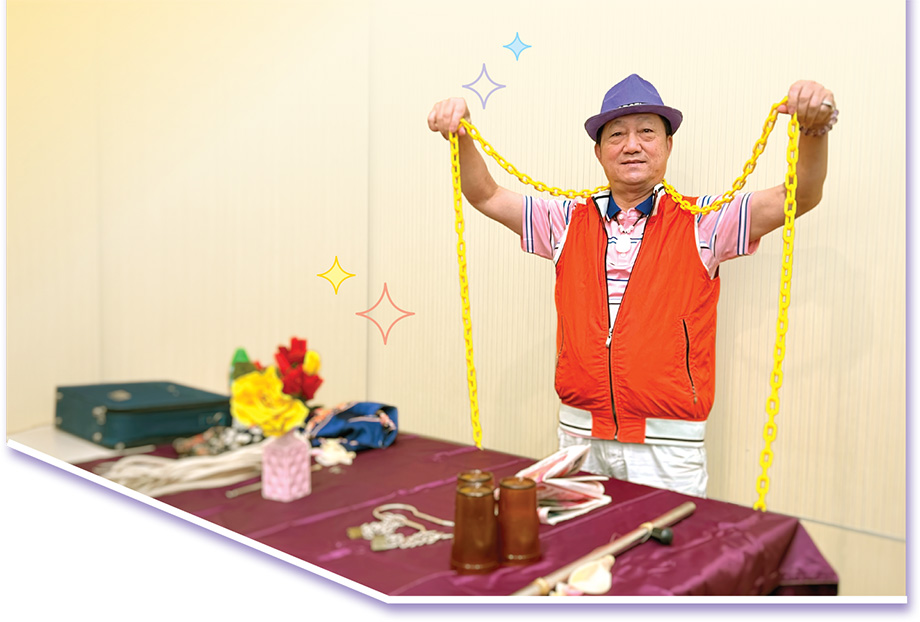
Mr Leung joined the civil service in 1971 after spending some years travelling around the world whilst working as a seafarer. Mr Leung recalled, “With a desire for stable working environment with long-term prospects, attractive salary and good benefits, after deep consideration, I decided to join the civil service.”
During the time working in the civil service, Mr Leung took up a number of posts of different nature within the Government. When he first joined the civil service, Mr Leung was a Semi-skilled Technician maintaining the landscape of several public gardens under the management of the then Urban Services Department. Afterwards, he changed to work as an Artisan (Lifeguard). Mr Leung then worked as a Foreman in the Hawker Control Unit (HCU), the Pest Control Unit and the Cleansing Section respectively before being promoted to Senior Foreman back in HCU, and proceeded to retirement in 1993.
Mr Leung noted, “It was not an easy job, and in fact, quite difficult and dangerous to work in the HCU during that time as the hawkers did not take too kindly to the enforcement officers from the Department.” He recalled a memorable scene during his tenure at HCU, “I remember once my team and I encountered a hawker who was selling cooked food near Caine Road in the Mid-Levels in an operation. We failed to arrest him that day because the hawker resisted and hit my colleague. His eyes were badly injured and he had to be sent to the hospital. A few weeks later, we were working near Caine Road in the Mid-Levels and we met that wanted hawker again. When the hawker saw us, he ran to the vicinity of the Peak Tram Terminus, ignited his trolley and then tried to escape. Immediately, I urged my colleagues to put the fire out and together we kept chasing after the hawker. Thankfully, we caught him not too far away in the end.”
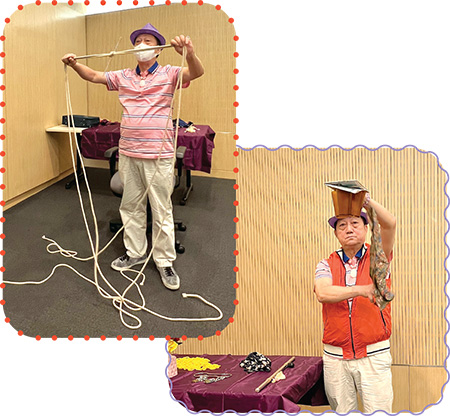
It was all worth it though as the career in the civil service brought Mr Leung many opportunities that enriched his life. As he put it, “I was very happy working for the Government as it gave me many chances to improve myself and opportunities to contribute to the community. Working in the civil service had inspired me to give back to the community, so I started my volunteer work during the spare time after work while I was in the civil service.”
After retiring in 1993, Mr Leung spent several years working abroad where he continued with the volunteer work. Even subsequent to his return to Hong Kong, Mr Leung’s enthusiasm in volunteerism had not faded away. He decided to further improve himself with a view to providing better service to the community through his noble work, “Becoming a volunteer helped enrich my life, enabled me to take a look beyond myself, and inspired my wish to learn an array of impressive skills like Chinese knotting, balloon modelling and decoration, handicrafts and even magic tricks.”
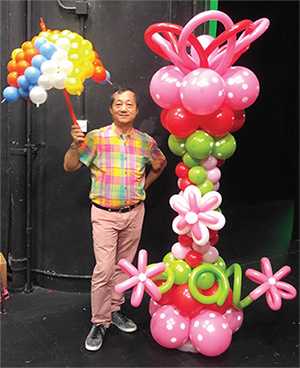
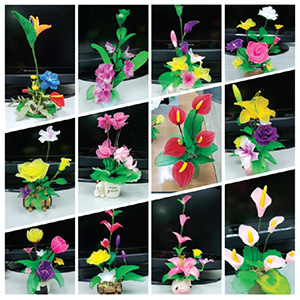
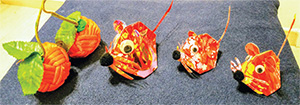
Equipped with an arsenal of new skills, Mr Leung decided to put them to good use by starting workshops for the underprivileged community groups. As one who has never been afraid of taking on a challenge, Mr Leung decided to hold workshops and teach the visually impaired to play magic tricks. He beamed, “Teaching the visually impaired how to play magic tricks is never easy. However, it is very rewarding when you see them develop the confidence to perform magic tricks in front of the audience. Some students are even able to add on their creativity to perform the magic tricks in cooperation with their guide dogs.”
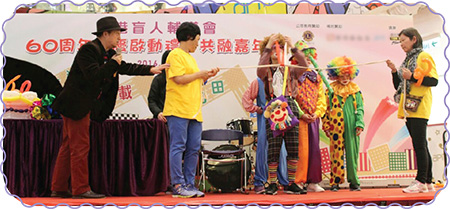
Mr Leung later decided to expand his service target to the elderly. He organised workshops to teach the elderly how to play magic tricks and make props and different kinds of handicrafts, such as lanterns, using unconventional materials. He quipped, “In fact, I think it’s more difficult to teach the elderly than to teach the visually impaired as it is not uncommon for them to be strong-willed and sometimes it is not easy for them to accept new ideas and follow the way we teach.”
Mr Leung further shared that he taught in each of the workshops with a sense of selflessness in giving back to others which was instilled in him throughout his two-decade career in the civil service to serve the public. He explained, “In my workshops, much more than skills and technique sharing, the objective is to inspire students to open their hearts and face their difficulties ahead. For example, one of the magic tricks that I teach my students is how to escape from a knot. I ask them to imagine that they are in the knot; the knot symbolises the challenge they are facing, and to think of how they might untie themselves from whatever it is that is holding them back. This inspires them to solve problems by themselves and not to become distressed or to attempt suicide when encountering challenges, as there are always ways to solve problems no matter how difficult they are.”
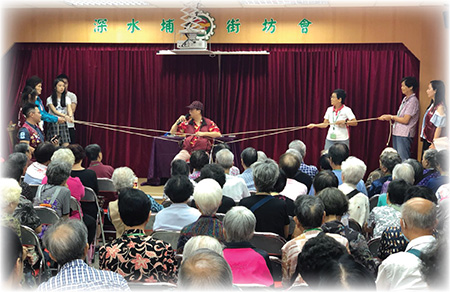
In addition to teaching students with physical impairments and the elderly, Mr Leung also teaches students with mental, intellectual and developmental disabilities. He said, “My workshops teach them how to think creatively and broaden their horizons. When they come on-stage performing magic, they can learn how to think quickly if something goes awry, and be trained to handle the situation and remain calm.”
Despite being voluntary work, the intensity is no less demanding than his time working as a Foreman in HCU. He said, “It is equally not easy for some young people to listen and follow what you teach them, and thus taxing your patience. More than that, I have come across some elderly students who suffer from emotional distress or with suicidal intentions. When this happens, I strive to help them to calm down and change their negative mindset into a more confident and positive one. Teaching these kinds of students is a totally different experience and I need to teach them with extra patience, care and empathy.”
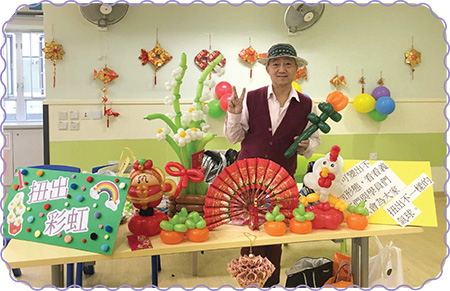
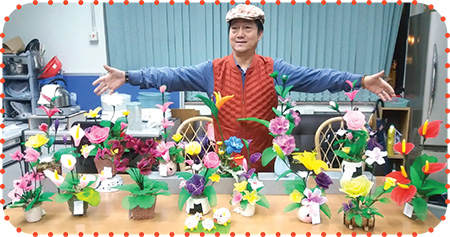
In addition to holding his own workshops, Mr Leung is also a volunteer for a territory-wise charity programme for the elderly, which aims at helping elderly patients who suffer from dementia to have better quality of life. As part of his volunteering in this programme, Mr Leung not only performs magic tricks to them for fun but also teaches the patients and their family members/caregivers how to do the tricks themselves so that they may share the joy of magic with their families and grandchildren. He shared, “As I am already in my seventies, this programme is a good way for me to let the elderly know that if I can do it, so can they.”
Taking a moment, Mr Leung shared a few words encouraging civil service colleagues to devote themselves to servicing the community, “Volunteering is a wonderful way to improve yourself and I recommend that civil service colleagues devote some of their spare time to giving back to the community. It is rewarding in the sense that not only it is a great way to help people in need but also to meet more friends, learn new skills and help others understand the work that we do in the civil service.”
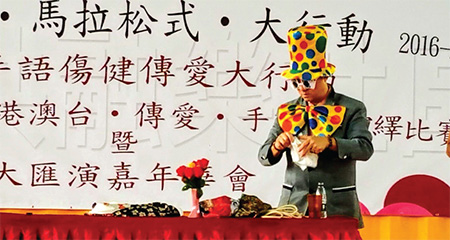
The sharing of interesting and impressive tour of volunteer services, combined with the energy and enthusiasm that Mr Leung displays, makes it easy to forget that he is in fact a retiree. Speaking on the challenges he has faced when adapting to retirement, Mr Leung shared, “Retirement is a different stage in life and going into it, I believe it is important not to stop learning or working. I view it very much as an opportunity to pursue further learning on areas that I was unable to go into in the past when I was too busy with work. If I were to just stay at home all the time without doing anything, it would be very boring. Sometimes, I will ask my friends and former colleagues to join me in volunteering after their retirement. I want to keep them busy as I have seen some elderly people whose lives have become dull and suffering from dementia as they stop learning and doing all the activities they enjoy once they retire.”
With the benefit of hindsight, his two-decade plus civil service career and wisdom learnt from retired life, Mr Leung makes a highlight of “life influencing life” to encourage civil service colleagues. He explained, “I would recommend my colleagues to do more volunteer work and to give back to society as this will help them improve their work-life balance and set an example for others to look to.” He added, “As civil servants, we need to work hard but it is also important to play hard. Volunteering is not only a good way to do this but is also a chance for us to do something that is meaningful and worthwhile. Most importantly, volunteer work is more rewarding than expected, as it is more blessed to give than to receive.”
Mr Leung shared some parting advice, “Nowadays and even in my time, people may have some misunderstanding towards the civil service and the work that we do. By giving back to the community, it is one of the ways that we can set an example for others to follow and will help create a positive image for the civil service in the society.”